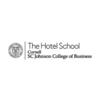Cornell Hospitality Quarterly Article Explains Investment Shortfall in Hotel and Restaurant Stocks
Market Timers for Hospitality Investment Have Been Exactly Wrong on Hotel Stocks

Ithaca, NY | An analysis of four decades of hospitality industry stock returns shows that investors have attempted to time the market—and missed. As explained by Cornell professor David Weinbaum, the timing of investment flows has been inverse to stock performance. Weinbaum's analysis of hotel investment and hospitality industry investing, "Assessing the Historical Performance of Hospitality Stocks: The Investor's Perspective,"is published in the February 2009 issue of Cornell Hospitality Quarterly. The journal is published by Cornell's Center for Hospitality Research, and the article about restaurant and hotel stock investment is available for free download at http://www.hotelschool.cornell.edu/research/chr/pubs/quarterly/featured/.
An assistant professor at the Cornell's Johnson School of Management, Weinbaum used a novel approach for calculating restaurant and hotel investment returns using a dollar-weighted rate of return. Examining investment flows into and out of hospitality stocks from 1962 through 2006, he determined that investors in hospitality stocks have attempted to time the market during that period. Then he compared the actual, dollar-weighted results to a "perfect" buy-and-hold portfolio of restaurant and hotel stocks. What he discovered was that the timing of investment inflows has been inverse to stock performance. That is, hospitality firms have issued equity capital near market highs, and they have retired capital near market lows.
The effect for hospitality investors of this inverse market timing is an overall shortfall of 1.5 percent per year in returns, Weinbaum calculated, compared to theoretical perfect timing. For hotel investing alone, the shortfall is 2.0 percent per year. "I point out that there are two sides to every trade, which means that for every market-timer who guesses wrong, someone else gains," said Weinbaum. "The investment flows show that the industry received money from investors at the top of the market, but the flow went from the industry to investors near the bottom. My analysis does not show the reasons for these results, but a large group of investors seem not to understand what drives hospitality stock values."
Published by Cornell's Center for Hospitality Research, the award-winning Cornell Hospitality Quarterly is available by subscription from Sage Publishing at http://cqx.sagepub.com/.
About the Center for Hospitality Research
The purpose of the Center for Hospitality Research is to enable and conduct research of significance to the global hospitality and related service industries. CHR also works to improve the connections between academe and industry, continuing the School of Hotel Administration's long-standing tradition of service to the hospitality industry. Founded in 1992, CHR remains the industry's foremost creator and distributor of timely research, all of which is posted at no charge for all to use. In addition to its industry advisory board, CHR convenes several industry roundtables each year for the purpose of identifying new issues affecting the hospitality industry.
Center Members: Accenture • Access Point Financial, Inc. • Barclaycard US • Cvent • Davis & Gilbert LLP • Deloitte & Touche USA LLP • DerbySoft • Four Seasons Hotels and Resorts • Fox Rothschild LLP • Hilton Worldwide • Host Hotels & Resorts • Hyatt Hotels Corporation • IDeaS Revenue Solutions • InterContinental Hotels Group • Jumeirah Group • Marriott International • NTT DATA • Preferred Hotels & Resorts • priceline.com • PwC • The Rainmaker Group • RateGain • ReviewPro • Revinate • Sabre Hospitality Solutions • STR • Taj Hotels Resorts and Palaces • Tata Consultancy Services • Wipro EcoEnergy • Wyndham Hotel Group
Glenn Withiam
607.255.3025
CHR
